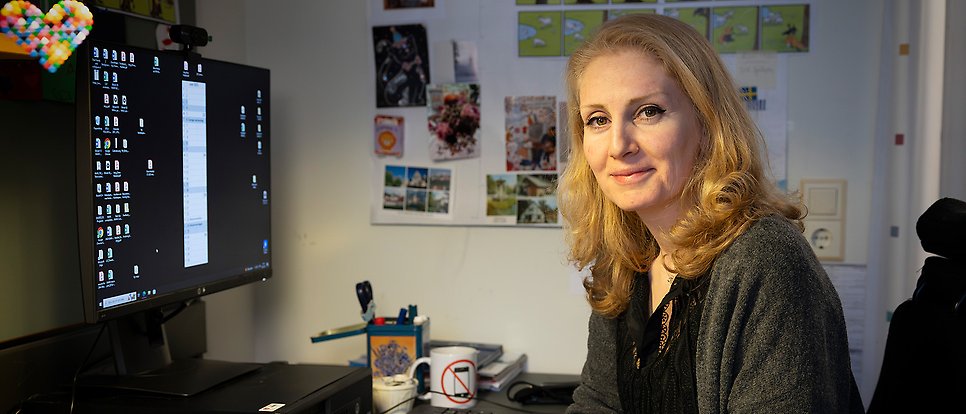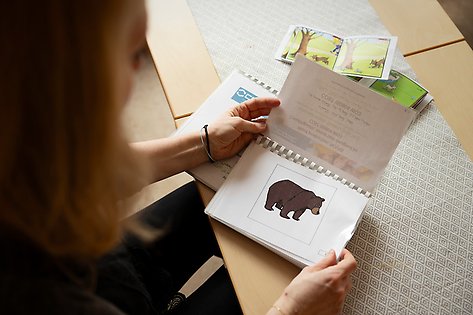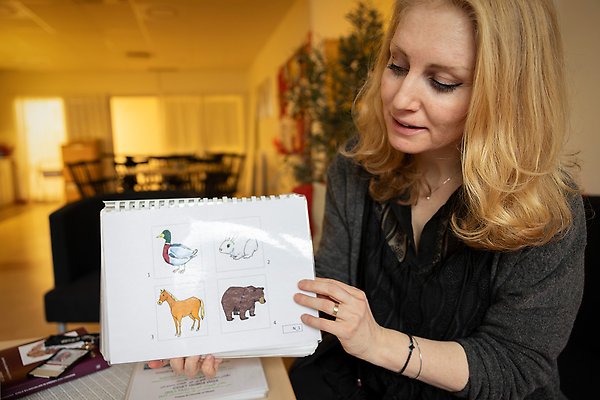Rima Haddad bridges gap between languages
Researcher profile

Haddad studies children both in Sweden and in Lebanon and travels between the two countries to collect data. Photo: Mikael Wallerstedt
Rima Haddad, a researcher in linguistics, has spent several years exploring multilingualism in children. Focusing on their storytelling skills, her work has shed light on how language development can enrich children’s lives and communities at large. But how is the research conducted and what conclusions has she drawn?

The researchers listen to the children’s stories.
The research, part of a large-scale project, examines multilingualism in children with child participants from Arabic, Turkish and German-speaking backgrounds. Between the ages of 4 and 7, Rima and her colleagues meet with the children to collect data.
“We listen to the children’s stories, point and look at pictures together and gather information,” explains Haddad.
The children communicate in their mother tongue with Rima and in Swedish with a colleague. Through data analyses, they explore different aspects of language development, including vocabulary, word comprehension and narrative technique.
“One of the most interesting findings is that background factors, such as parental language and exposure to different languages, have a significant impact on children’s language development. Reading in the mother tongue not only strengthens that language but has no negative impact on the Swedish language.”
Travels between Sweden and Lebanon
Haddad studies children both in Sweden and in Lebanon. She takes the time to travel between the two countries to collect data from different cultural backgrounds. On her own initiative, she contacts schools and organisations in Lebanon, where she spent two months collecting data.
“Working in this interdisciplinary way gives me a broader understanding of multilingualism and its effects,” she says.
From multilingual student to researcher
Her personal experience of being multilingual has been a source of inspiration for her research. With a background of speaking both Arabic and Swedish, she has identified strongly with the subject and its importance.
“I took my Master’s degree in linguistics in Lebanon, where I studied English linguistics. I then went on to study it in Skåne too. Language has always been important in my family,” recounts Haddad.

“Promoting the mother tongue not only benefits the individual’s linguistic abilities, but also enriches Swedish society as a whole,” says Rima Haddad. Photo: Mikael Wallerstedt
By combining her passion for language with linguistic expertise, she has been able to successfully navigate this field of research.
Given the positive impact that multilingualism has on children’s development and the diversity of society, it is important to emphasise the significance of strengthening the native language.
“Promoting the mother tongue not only benefits the individual’s linguistic abilities, but also enriches Swedish society as a whole,” adds Haddad.
Schools play important role
In general, parents are in favour of their children being multilingual and see the value of preserving their mother tongue. Schools play an important role in supporting this by creating an environment that encourages multilingualism and multicultural understanding.
Haddad hopes her research will open doors to a deeper understanding of multilingualism and its impact on children’s lives.
“By continuing the research in this area, we can improve support for multilingual children and promote diversity and inclusion in society.”
Agnes Loman
Facts: Rima Haddad
In your spare time: Lots of family time and traditional Greek dancing
Latest book read: Mostly children’s books but also books about children
Favourite dish: Tabbouleh (the real one, without raisins and couscous!)
Driving force as a researcher: Knowing the truth and inspiring people – but also deadlines.
Where and when you get your best ideas: When I’m lying in bed and trying to sleep.
Hidden talent: My family, friends and colleagues say that I’m good at organising fun events.
If you hadn’t become a researcher, what would you have done? Graphic design or human rights work
